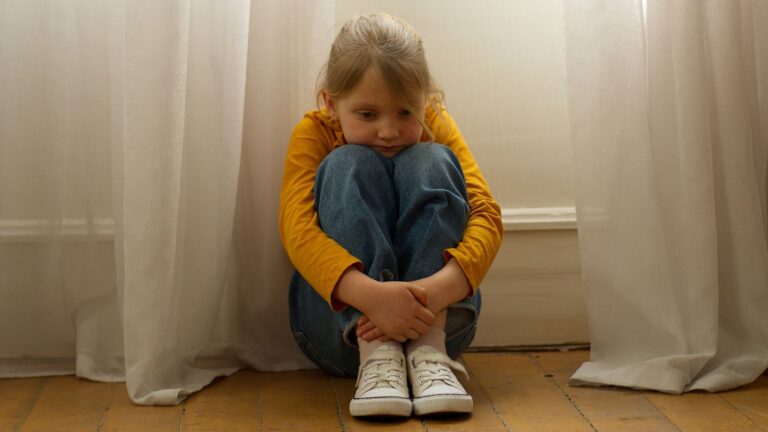It can be very difficult to untangle our normal personality traits from behaviors we’ve developed as a way to cope with past traumas or hardships. However, it’s very important to recognize these traits so we can better understand how we can heal. Through our list, we show a few signs that point to you having underlying issues from childhood and how they show up in adulthood.
Low Self-Esteem

It’s hard to find someone with childhood trauma who doesn’t struggle with low self-esteem. Constant self-doubt and negative self-talk often stem from childhood experiences of criticism or neglect. But the good news is that working on self-acceptance and positive affirmations can really improve your confidence and ability to love yourself.
Difficulty Expressing Emotions

We’ve all been in situations where it feels almost impossible to express your emotions openly, but this can be a daily battle for people with unresolved childhood issues. Childhood environments where emotions were invalidated or suppressed will naturally cause kids to grow up feeling like they’re not safe to open up. It’s super important to learn how to identify and express emotions in a healthy way if you want to improve your well-being and build stronger relationships.
People-Pleasing Tendencies

A lot of us know what it’s like to always put others’ needs before our own and seek approval. While this can sometimes be beneficial for those around us, it comes at the cost of our own health and well-being. This habit typically comes from unresolved issues from childhood, such as a need for acceptance or a fear of rejection.
Difficulty Trusting Others

As noted by Psych Central, it’s very common that trust issues are rooted in hurtful childhood experiences when trust was broken. If you notice that you’re always questioning others’ intentions or struggle to rely on people, this could be due to your unresolved issues. In these cases, the best course of action is to work on building trust gradually through dependable relationships, preferably with the help of a mental health professional.
Fear of Abandonment

A deep-seated fear of abandonment can make people seem clingy or overly dependent on their close ones. While some people may condemn this as a toxic trait, it’s actually a very common response to childhood experiences of loss or neglect. By addressing these fears through therapy or trustworthy confidants, you can begin to create healthier relationship dynamics.
Perfectionism

Some people admire perfectionists for their dedication to perfection and their high-quality work. But this often stems from unresolved childhood issues with shame and comes at the cost of their own well-being. When you’re always setting unrealistically high standards for yourself, it’s hard to ever feel satisfied with yourself or what you do.
Chronic Anxiety

If you know someone who often feels anxious, it might be because of unstable or traumatic experiences from childhood. Chronic anxiety can show up as constant worry and fear of the unknown, which can make day-to-day life very challenging. However, therapy and mindfulness practices can be really beneficial in helping you to manage anxiety and improve your quality of life.
Avoidance of Conflict

People who avoid conflict at all costs typically struggle with unresolved childhood issues, especially if they grew up in a conflict-heavy or emotionally charged environment. But anyone can learn to build healthy conflict resolution skills that make relationships much more balanced and fulfilling.
Overachieving

It can be hard to look at someone who’s achieved so much in their life and think that they struggle with childhood trauma, but this is often the case. Striving for constant success and overachieving is a behavior that often comes from a need for validation and a deep fear of failure. It’s important to find a balance between ambition and self-care to look after yourself and your well-being in the long term.
Fear of Intimacy

A fear of getting emotionally close to others often points to unresolved childhood trauma and can make it difficult to form deep, meaningful relationships. Working through these fears with a therapist can help build healthier and more intimate connections.
Dependency on Others

As you’d probably imagine, relying excessively on others for emotional or financial support can be a strong indication of unresolved childhood issues. Sadly, this dependency is commonly traced back to a lack of stability or support during childhood. However, anyone can boost their self-reliance, and going to therapy can help you become much more independent.
Inability to Say No

Always agreeing to what others want and finding it hard to stand your ground can point to unresolved issues from childhood. This usually comes from a fear of being rejected or wanting to please everyone. Learning to say no and setting boundaries is key to your well-being.
Resentment and Bitterness

Holding onto feelings of resentment and bitterness towards others can be a sign of unresolved childhood trauma. These negative emotions often come from feeling wronged or neglected when you were younger. Talking through these feelings with a therapist can help you let go of their hold on your life.
Over-Sensitivity to Criticism

Being overly sensitive to criticism and taking feedback too personally often points to unresolved issues from childhood. This can develop from experiencing harsh criticism or having unrealistic expectations placed on you. Building self-confidence and resilience can help you handle criticism better.
Difficulty Maintaining Relationships

If you know someone who has a hard time keeping long-term relationships, it might be due to unresolved issues from childhood. Trust issues, fear of getting close to others, and low self-esteem can all play a role in relationship problems. Therapy and self-awareness can help improve how you relate to others.
Impulsivity

Contrary to what some people believe, impulsive behavior can be a sign of unresolved childhood trauma. This often looks like having trouble controlling impulses and making quick decisions without thinking. Developing better impulse control through mindfulness and therapy can help you make better choices.
Chronic Pessimism

Always expecting the worst and focusing on negative outcomes often hints at unresolved issues from childhood. This kind of pessimism can come from growing up in a negative or unstable environment. By shifting your focus to positive aspects and practicing gratitude, your overall outlook on life can improve.
Lack of Boundaries

It’s common knowledge that struggling to set and maintain personal boundaries can signal unresolved childhood trauma. This difficulty usually comes from a background where boundaries weren’t respected. Learning how to establish and enforce boundaries is essential for building healthy relationships.
Self-Sabotage

Engaging in self-sabotaging behaviors like procrastination or negative self-talk often points to unresolved childhood issues. These habits can be rooted in a fear of success or low self-esteem. Recognizing and addressing self-sabotage can help you achieve personal and professional growth.

